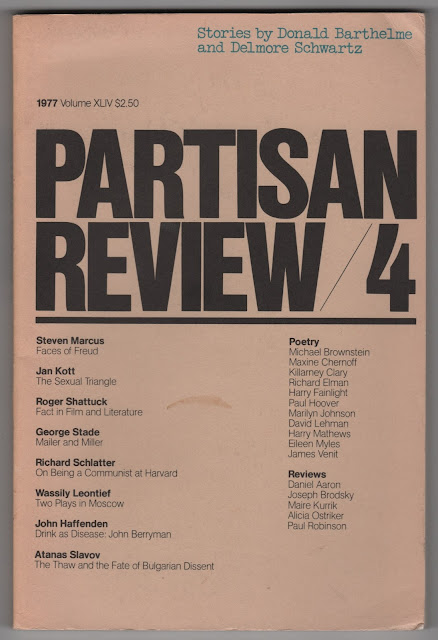The continuing reorganization of the house turns up items I haven't looked at for some years, including this issue of Partisan Review, which boasts of two short stories ahead of any other contents, and two stories which turned out to be relatively useful signposts of where their authors were Going at time of composition.
The Donald Barthelme became the title story of the eventual collection (see cover below) and is one of a series of his later stories which eschewed anything but dialog, often in telling less a narrative than giving a sense of what might be gleaned from seemingly random (at least at first) snippets of conversation, some single lines alone, others brief segments of conversations, in this case what sounds very much like what one might overhear while walking toward, into and through an art-show opening (one might recall that Barthelme worked in museums as well as a writer). The apparently untethered statements of slightly addled folks or otherwise atypical people one might've passed by to the eventual party, along with apparent statements by police into their radios, eventually give way to variously anodyne, clever and/or snarky statements and exchanges from the denizens of the gallery show and cocktail party within the destination. Barthelme seems to be reaching for a sort of fake-reportage in how he shapes these transcript-like records, and given he or his editor made this one the title story for the collection, someone was particularly happy with this one (or simply liked the title)...it is certainly readable and potentially less upsetting to the casual reader than some other examples of Barthelme in this mode, such as one (I can't currently recall the title) which seems to be told/transcripted from the POV of a man who is dying of a heart attack or something similar. Good chance it's in the collection pictured below, and it might be "The Crisis". Barthelme adapted some of the stories from the collection, presumably including the title story, into a play for voices also entitled Great Days.
While the Delmore Schwartz story was composed about the the same time as "In Dreams Begin Responsibilities", 1937, but unlike that clangorous story (first published in the then-young Partisan Review in 1938), "Screeno" was not published until more than a decade after Schwartz's death, in this issue of PR, from a manuscript that had been collected in his papers, and was put forth by his son for reprinting in book form in the first edition of the 1978 collection named for "In Dreams..."; perhaps Schwartz thought of it as too similar in setting and incident, at least, to "IDBR", as it also involves a young man not unlike Schwartz himself going to catch a film in a theater...the film itself, in this case, being less fantastically a reflection of his chaotic life than the lottery run (instead of giving away plates or the like to customers, in a Depression movie house) and the protagonist the winner of a grand "Screeno" (like Bingo) prize, only (to the dismay of the theater's management) another claimant on the grand prize emerging from the audience with a reasonably legitimate claim to an identical grand prize of $425 (in 1937 dollars)...and the various bickering and small or not so small mercies which result. Perhaps also, Schwartz felt "Screeno" too sentimental in comparison to "In Dreams...", though as a "new" story in 1977, it was later used as the title story of an eventual New Directions paperback anthology gathering later-published/collected work, cover below.
What struck me most about "Screeno" was how much it reminded me also of another story from not long before its composition, not so much in incident as in ambition and tone, William Saroyan's "Seventy Thousand Assyrians", like the Schwartz about a young writer in the Depression none too certain of how things are going to work out for him, encountering some other folks whose current state is that much worse, and with the author's analog within the story not too sure of how he might help in the long run, but grateful for what little he could do immediately, and enraged in a quiet way, for the predicament they all find themselves in. As Cynthia Ozick notes in the introduction to the Screeno collection, Schwartz's training in and passion for philosophy raises its head in the story, along with Schwartz's love of poetry...a T. S. Eliot poem is quoted along with a far older work. (It's notable that not only the hipster but au courant literary hipster cred of Schwartz's one-time student Lou Reed had risen sufficiently for the latter to be invited to write a new foreword to the second edition of the IDRB and Other Stories collection).
It's rather unsurprising that Partisan Review was happy to be the first publication source for both of these, however belatedly with the Schwartz.
For more of today's Short Story Wednesday reviews, please see Patti Abbott's blog.






No comments:
Post a Comment
A persistent spammer has led to comment moderation, alas. Some people are stubborn. I'm one.